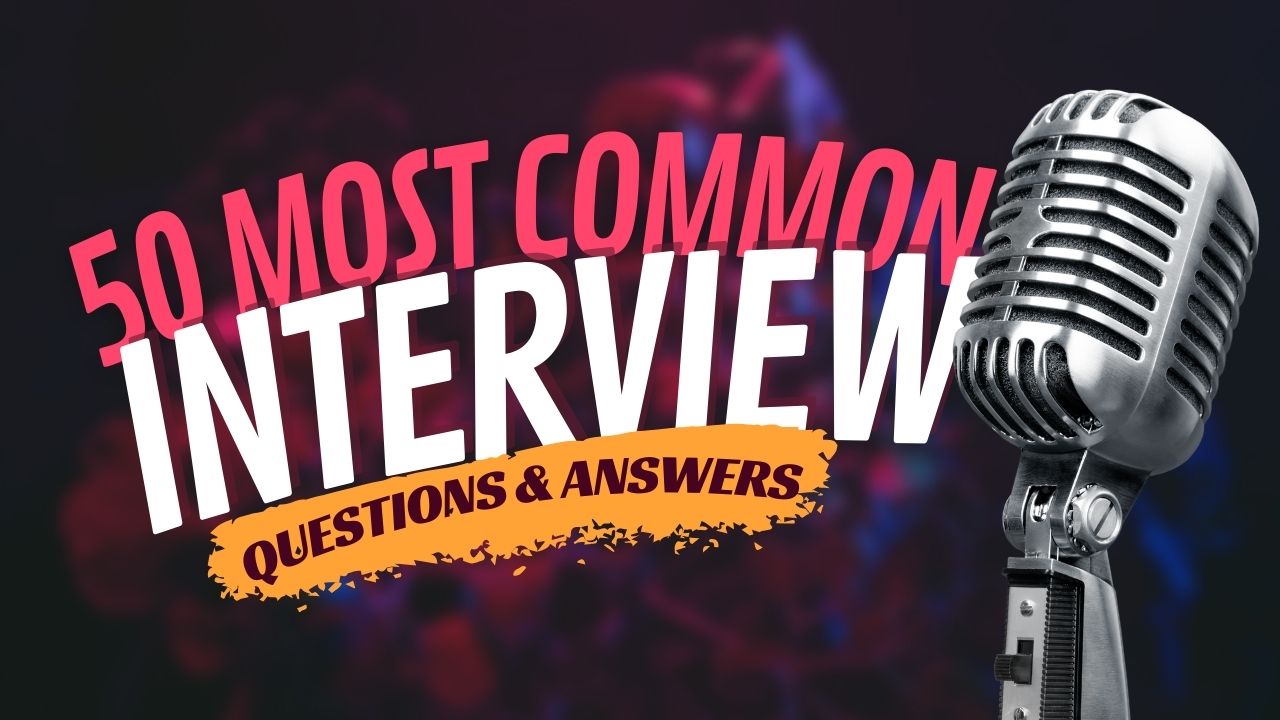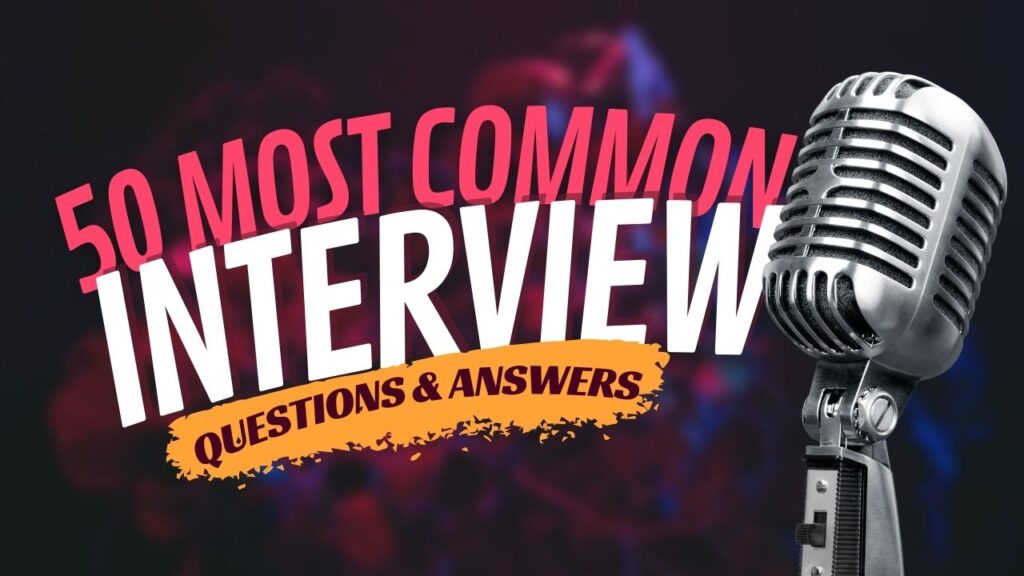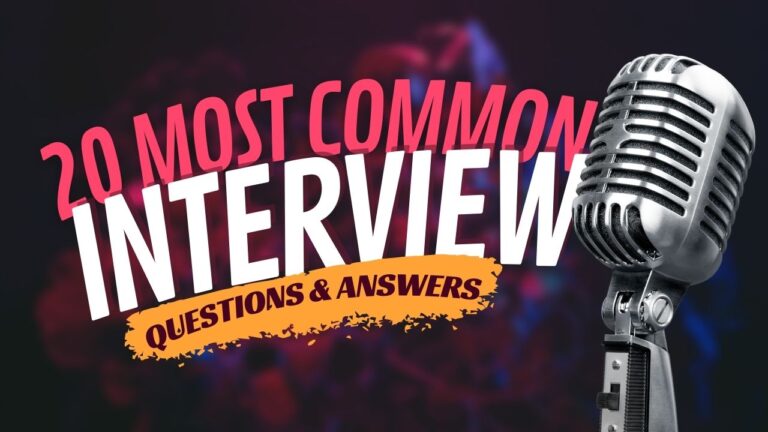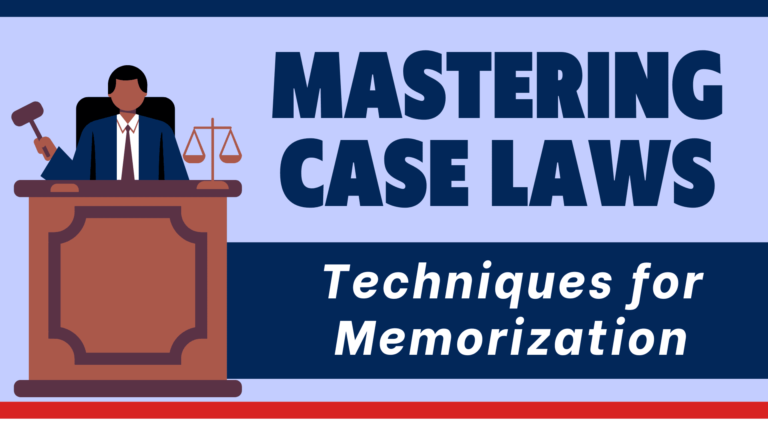50 Common Job Interview Questions: Crack Your Next Interview

Preparing for a job interview becomes manageable when you know what to expect. One key aspect of the interview process is the questions you’ll face.
Understanding the 50 most common job interview questions can boost your confidence and help you deliver compelling responses.

Knowing how to answer the questions effectively can set you apart from other candidates and put you on the path to career success.
Mastering the common interview questions can position you as a strong candidate in any job interview house. Your goal is to craft concise, honest, and engaging answers that showcase your strengths and alignment with the job role.
Personal Background and Introduction

Tell Me About Yourself
Start with a brief professional summary. Mention your current or most recent job title, key achievements, and relevant skills. For example: “I am a project manager with over ten years of experience managing cross-functional teams and delivering complex projects on time and within budget.”
Career Path
Outline your career path. Show how each role has prepared you for this opportunity. Highlight job titles, companies, and noteworthy projects. “I began my career as a software developer before transitioning into project management. At XYZ Corp, I spearheaded a project that increased efficiency by 20%.”
Educational Background and Qualifications
Briefly mention your educational background and qualifications that are relevant to the job. Include the degrees you hold and any certifications. “I hold a Bachelor’s degree in Computer Science from ABC University and a certification.”
Describe Yourself
Use adjectives to convey your personality traits and strengths. Choose words that are professional but also reflect who you are. “I am detail-oriented, results-driven, and a strong communicator. My colleagues describe me as reliable and proactive.”
Prior Work Experience
Summarize your prior work experience. Focus on roles and responsibilities that align with the job you’re applying for.
“In my previous role at XYZ Corp, I led a team of 45, managed budgets, and consistently met deadlines on major projects.”
Soft Skills
Mention soft skills that make you an ideal candidate. These could include teamwork, leadership, or problem-solving abilities.
“My strong suit includes effective leadership and collaboration skills, which have allowed me to build strong teams and satisfy clients.”
Recent Graduate
If you are a recent graduate, focus on internships, projects, and any relevant experience. Highlight your enthusiasm and readiness to start your career.
“As a recent graduate with a degree in Artificial Intelligence, I completed internships at leading agencies and worked on several campaigns that honed my strategic thinking.”
Resume Highlights
Briefly touch on what your resume shows about your career and achievements, guiding the interviewer to key points they should notice.
“My resume highlights my track record of successfully managed projects, my educational qualifications, and relevant skills that make me a strong candidate for this role.”
Personality Traits
Share what makes you unique. Include traits that align with the company’s values. “I am highly adaptable, always eager to learn, and thrive in dynamic environments.
50 Common Job Interview Questions

Q: Can you describe a time when you had to manage a difficult project?
A: Sure, I led a team to redevelop our website under a tight deadline. We faced several challenges including delayed deliverables and technical issues. I prioritized tasks, coordinated with the team, and kept communication clear. We completed the project on time and improved site performance by 40%.
Q: How do you handle conflict in the workplace?
A: I address it directly and respectfully. I listen to all parties involved, seek to understand their perspectives, and find a middle ground. For example, I once mediated a disagreement between two team members by focusing on our common goals and fostering a collaborative atmosphere.
Q: What is your greatest professional achievement?
A: One of my proudest moments was leading a campaign that increased our customer base by 20% in six months. I developed a targeted strategy, coordinated with marketing and sales teams, and tracked metrics to optimize our approach.
Q: Describe a situation where you had to learn something new.
A: In my last role, I had to learn a new software to manage an important project. I dedicated extra hours to online tutorials, asked colleagues for tips, and practiced regularly. Within two weeks, I became proficient and could train others.
Q: How do you prioritize your work?
A: I use a combination of urgency and importance to prioritize tasks. I create a daily to-do list and categorize tasks. I tackle high-impact, time-sensitive tasks first. For instance, when preparing for a product launch, I focused on critical deadlines while delegating less urgent tasks.
Q: What motivates you to perform well at work?
A: I’m driven by a desire to achieve goals and help my team succeed. Seeing the positive impact of my efforts, such as increased sales or improved processes, motivates me. Additionally, personal growth and learning opportunities keep me engaged and motivated.
Q: How do you respond to feedback?
A: I view feedback as an opportunity to improve. I listen attentively, ask questions for clarification, and take actionable steps to implement changes. For example, after receiving feedback on my presentation skills, I attended a workshop and practiced regularly, which significantly improved my confidence and delivery.
Q: Can you give an example of a time you showed initiative?
A: In my previous role, I noticed a gap in our customer service processes. I designed a training program to address it, presented the idea to management, and led the first session. It resulted in a 10% increase in customer satisfaction scores.
Q: How do you stay updated with industry trends?
A: I subscribe to industry newsletters, follow thought leaders on social media, and attend webinars and conferences. I also participate in relevant online forums and read industry reports regularly to stay informed about the latest trends and developments.
Q: Describe a time you disagreed with a decision at work.
A: I once disagreed with a proposed change in workflow. I gathered data to support my case and scheduled a meeting with my manager. We discussed the pros and cons, and ultimately, we adjusted the plan to incorporate my suggestions, which led to a smoother implementation.
List of additional Questions
- Can you describe a project where you faced significant challenges and how you overcame them?
- How do you prioritize tasks when you have multiple deadlines to meet?
- Tell me about a time you had to learn a new tech quickly.
- Describe a situation where you had to work with a difficult team member. How did you handle it?
- What strategies do you use to stay motivated during repetitive tasks?
- Can you give an example of how you contributed to a team’s success?
- How do you handle constructive criticism from supervisors or peers?
- Describe a time when you had to make a tough decision with limited information.
- How do you ensure you are aligned with your team’s goals and objectives?
- Can you discuss an instance where you had to adapt to a significant change in the workplace?
- What methods do you use to evaluate your own performance?
- Describe a time when you identified a problem in your workplace and how you addressed it.
- How do you approach setting and achieving long-term career goals?
- Tell me about a time you had to persuade someone to see things your way.
- What role do you typically take on in team settings, and why?
- How do you keep up with industry trends and advancements in your field?
- Can you discuss a time when you had to manage a project with a tight budget?
- What is your approach to handling stress and pressure at work?
- Describe a situation where you had to collaborate with a cross-functional team.
- How do you balance the need for quality work with tight deadlines?
- Can you provide an example of how you’ve used data to inform your decision-making?
- How do you approach conflict resolution in a professional setting?
- Describe a time when you exceeded expectations in your role.
- What steps do you take to ensure effective communication within your team?
- How do you handle situations where you disagree with your manager’s decisions?
- Can you share an experience where you had to mentor or train someone?
- Describe a time when you had to pivot your strategy mid-project. What prompted the change?
- How do you ensure that your work aligns with the company’s mission and values?
- What is your experience with remote work, and how do you manage productivity in that environment?
- Can you discuss a time when you had to implement feedback from a performance review?
- How do you approach networking within your industry?
- Describe an innovative solution you’ve developed for a work-related problem.
- How do you handle competing priorities from different stakeholders?
- Can you give an example of a risk you took in your career and the outcome?
- What tools or technologies do you find most helpful in your work, and why?
- How do you ensure that your team remains engaged and productive?
- Describe a time when you had to advocate for a change within your organization.
- How do you measure success in your role?
- Can you share an example of how you’ve contributed to a positive company culture?
- What do you believe are the key qualities of a successful leader, and how do you embody those qualities?
Conclusion

Preparing for a job interview is crucial. Familiarize yourself with common questions and practice your answers. This boosts your confidence and helps you respond clearly.
Pay attention to behavioral questions. This methodology keeps your responses concise and insightful.
Remember, follow-up after the interview is important. Send a thank-you email to reiterate your interest and highlight key points from the interview. This shows your enthusiasm and professionalism.
Good preparation combined with thoughtful follow-up actions can make a big difference in your job search journey.
Frequently Asked Questions

In job Interviews, some questions come up often. These questions help employers understand how you heard about the position, what you know about the company, and why you want to work there. They also assess your strengths and suitability for the job.
How did you hear about this position?
Employers ask this to know your sources and interest in their job opening. Be honest. You can mention if you saw it on their website, a job board, a referral from a current employee, or another source.
What do you know about our company?
This question checks your research skills and genuine interest. Mention specific facts like the company’s mission, values, recent projects, or news. This shows you’ve done your homework.
Why do you want to work at this company?
Here, employers want to know if your goals align with theirs. Share specific reasons that excite you about the company. This could include the work culture, growth opportunities, or alignment with your career path.
What are your greatest professional strengths?
This question is your chance to highlight what you’re good at. Be ready to give examples of your skills. Focus on strengths that are relevant to the job you’re applying for, like problem-solving, teamwork, or leadership.
Why should we hire you?
Employers ask this to see why you stand out. Show how your skills, experiences, and qualities make you the best fit for the job. Use specific examples to demonstrate your value and how you can contribute to their goals.
All the Best !






